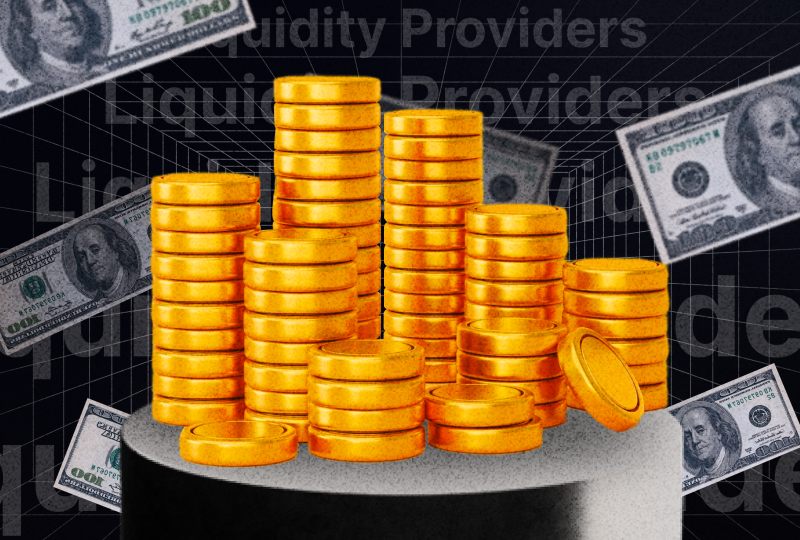Morning Brief: From Inflation, Investment in Crypto to Taiwan Semiconductor Manufacturing
Aug 08, 2022

Inflation data, Сoncerns About 'a Hard Landing Later'
This week's inflation figures could either boost or derail the market's summer momentum. Investors will get the most recent indication of how swiftly prices are growing across the US economy from three upcoming releases: PPI, CPI, and unit employment costs.
The figures are anticipated to impact how Federal Reserve officials proceed with the rate hike cycle, and they will be carefully watched after Friday's monster employment report signaled that more aggressive rises may be necessary to slow the growth.
According to the Labor Department, the U.S. economy generated 528,000 jobs in July, more than twice as many as experts predicted, despite forecasts that job growth would slow as tighter monetary conditions and firm cutbacks fueled recession worries. Furthermore, the statistic represented the labor market's full return to pre-pandemic levels. The data suggested that labor conditions were robust enough for the Federal Reserve to continue raising interest rates. Continue Reading
JP Morgan Rolls Out Cross-Border Liquidity Product in Saudi Arabia
JP Morgan Payments has introduced a cross-border liquidity service in Saudi Arabia that connects clients to liquidity pools in London and other international locations.
The service will give customers a pipeline that will connect their balances to liquidity facilities all around the world. The product's major benefits include improving liquidity in Saudi Arabia, automating cash consolidation from numerous accounts into a single account, and increasing linkages to offshore structures.
The solution aims to "enable companies to reduce idle balances and use internal money wisely, improving deficit balances and eliminating overdraft fees" by optimizing liquidity transfer payments, according to Lori Schwartz, global head of liquidity and account solutions at JP Morgan Payments. Continue Reading
Chinese Tech Giant Invests Alongside CIA Fund in British Army Software
Tencent, a Chinese technology company, has invested in a British start-up that is developing simulation software for the Army, despite increased tensions between Beijing and the West. The Chinese game giant took part in a £15 million fundraising round for Hadean, which creates technology to bring tens of thousands of virtual warriors onto digital battlefields, in a deal considered to be too small to warrant a National Security assessment.
In a further twist, Tencent participated in the investment round with In-Q-Tel, a US venture capital investor funded by CIA money.Hadean has also received funds from the Government's Future Fund, Rishi Sunak's start-up rescue fund established during the epidemic. Experts from the National Security Strategic Investment Fund are advising it (NSSIF).
Molten Ventures, which is listed in London, also made an investment. The NSSIF, which was established in 2018, invests in extremely sensitive military start-ups and is closely related to GCHQ. It also provides access to security professionals at the core of Britain's intelligence community to start-ups. As a result of the agreement, the British government, a CIA-backed fund, and one of China's largest technological firms are all partners in the same endeavor. Continue Reading
Bank of Thailand to Launch Retail CBDC Pilot
The Bank of Thailand has announced the start of its retail Central Bank Digital Currency (CBDC) pilot program, which will run from late 2022 to mid-2023. The research, according to Vachira Arromdee, deputy governor of the central bank, would match the attention of other central banks, concentrating on the expansion of retail CBDC and its potential repercussions throughout the banking industry.
The Bank of Thailand is one of the first central banks to investigate the possibility of retail CBDC for their financial ecosystem's future. The change provides a chance for the Thai economy to diversify and for enterprises to get access to more user-friendly and cost-effective financial services. The pilot will be divided into two parts: the Foundation and the Innovation.
The CBDC technology will be tested in payment actions by 10,000 retail users chosen by the Bank of Thailand, Bank of Ayudhya Public Company Limited, and Siam Commercial Bank Public Company Limited during the Foundation phase. Giesecke+Devrient will create the technology.While the Innovation stage will evaluate the programmability and development of CBDC for a variety of customers, with the goal of observing real-world CBDC applications and adapting its design to Thai retail consumers. Continue Reading
Taiwan Is in the Spotlight. The Risk to Investors Is Growing
Technology investors are on nerves, waiting to see if US House Speaker Nancy Pelosi's historic visit to Taiwan would elicit a cascade of Chinese replies.While the likely upshot in the immediate term is more threatening rhetoric, the prospective trip serves as a reminder of Taiwan's major risk to the US technology sector because Taiwan produces the majority of the world's cutting-edge semiconductor chips. Pelosi arrived in Taipei on Tuesday, becoming the first Speaker to visit the country since Newt Gingrich in 1997. China has so far reacted to the visit by prohibiting some Taiwanese imports and conducting live-fire military drills surrounding the island, which it considers a breakaway province. Some analysts are afraid that the likelihood of a future Taiwan invasion is increasing.
Investors must consider the inherent unpredictability of geopolitics while appraising the scenario. Some things that appear unlikely one day may occur the next. Any possibility of a conflict between China and the United States should be taken seriously, primarily because the results would be catastrophic. It's difficult to overestimate Taiwan's importance to the United States and the global IT environment. Taiwan manufactures the majority of the sophisticated chips necessary for military defense systems and business computer services. Taiwan accounts for more than 90% of the world's most sophisticated semiconductor production, with South Korea accounting for 8%.
Taiwan Semiconductor Manufacturing (TSM), which was founded in 1987 and pioneered the business concept of manufacturing chips for external clients, provides the majority of the capacity. It is the world's largest third-party foundry, controlling the market for high-end chips such as the core processors inside Apple's (AAPL) iPhones, Qualcomm's (QCOM) smartphone chips, and Advanced Micro Devices' computer processors (AMD). A military war over Taiwan might shut down all of Taiwan Semiconductor's production, creating trouble across the technological supply chain for those firms. Continue Reading
BlackRock Wants to Help Some Investors With Crypto. Here’s the Take for Advisors
BlackRock CEO Larry Fink mentioned cryptocurrency research in his annual letter to shareholders. He cited some of the advantages of this new category, such as speedier settlements and cheaper foreign transaction expenses. Fink is now taking action. BlackRock (BLK) announced a cooperation with v (COIN), a leading cryptocurrency platform, on Thursday, using BlackRock's Aladdin investment management system. Coinbase's stock rose 10% to $89.50 in response to the announcement. However, BlackRock's stock was up less than 1%.
Users of BlackRock's Aladdin platform will be able to use Coinbase assets — initially just Bitcoin — while managing portfolios and doing hazard identification. "This integration will offer institutional-grade capabilities to the management of crypto exposure across the investment lifecycle, from compliance, portfolio management, trading, operations, and risk management," according to the news announcement. Given BlackRock's massive scale, this crypto initiative will be a true test for that highly volatile asset class.
Earlier this year, a Nasdaq poll of 500 investment advisors revealed that they were bullish on cryptocurrency. Approximately 86 percent of those with clients who already hold digital currencies or are considering doing so said they planned to increase their holdings. The turmoil has prompted lawmakers to enact new rules. Senators Debbie Stabenow (D-Mich.) and John Boozman (R-Ark.) presented legislation this week that would use the Commodity Futures Trading Commission to enforce cryptocurrency regulations. Initially, the focus will be on Bitcoin and Ether. Continue Reading




